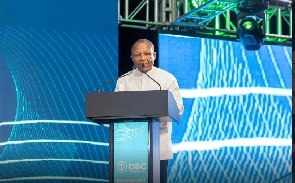 Chief Executive Officer of Development Bank Ghana, Kwamina Duker
Chief Executive Officer of Development Bank Ghana, Kwamina Duker
Kwamina Duker, Chief Executive Officer of Development Bank Ghana, has reiterated his outfit’s commitment to supporting and building bankable and competitive local businesses that can pit their strength against consumer alternatives coming mostly from foreign markets.
Mr. Duker was speaking at the 30th Annual Meeting of the African Export-Import Bank (Afreximbank) in Accra as a panellist during a plenary discussion with other distinguished industry captains, development experts and policymakers on the topic ‘Leveraging the Power of Intra-African Trade for Commodity Based Industrialisation’.
The panel discussions were a part of a series of sessions at the gathering, and sought to highlight the peculiar challenges that beset African economies when it comes to adding value to extracted raw materials before exporting them to foreign markets.
The discussions’ objective was to find ways of breaking the cycle of exporting unfinished goods and importing finished products – much to the detriment of the respective African economies; and also how to take control of Africa’s commodities and expand the value chain systems so as to be enabled in creating the necessary socio-economic development.
Addressing how small- to medium-size enterprises are being integrated into the industrialisation process, Mr. Duker indicated that for a very long time the focus has been on the extractive sector, and this has caused little investment into human capital; thus denying us any opportunity of moving up the value chain.
According to DBG’s Chief Executive Officer: “Moving up the value chain is critical but also complex; because once you move up from the extraction or out-grower phase, you come into the market forces phase – which you must be able to respect in order to thrive”.
He added that: “For us as a development bank, we are focused on changing the mind-sets of local businesses and making them bankable so they can be competitive on the global market”. He further explained that it is essential for businesses which have been able to move up the value chain to have a mindset to compete, especially due to alternatives consumers are presented with on the market. And to achieve this, such businesses must be bankable so as to overcome the market forces."
In addition, Mr. Duker emphasised the importance of setting a “criteria for success” for local businesses, whereby businesses after a period of receiving support must be able to take-off and run by themselves in order to achieve sustainable prosperity.
According to him, this will be a measure of success for the investment placed into such businesses.
Other panellists for the session on ‘Leveraging the Power of Intra-African Trade for Commodity Based Industrialisation’ were Professor Théophile T. Azomahou, Executive Director-Africa Economic Research Consortium; Dr. Carlos Lopez, a Professor at the University of Cape Town; Ms. Florie Liser, President & CEO-Corporate Council on Africa; Ms. Ahunna Eziakonwa, UNDP Assistant Administrator & Regional Director for Africa; Mr. Antonio Pedro, Acting Secretary, United Nations Economic Commission for Africa; and Mrs. Kanayo Awani, Executive Vice President, Intra-Africa Trade-Afreximbank.
The African Export-Import Bank (Afreximbank) is a pan-African multilateral financial institution mandated to finance and promote intra-and extra-African trade. Afreximbank deploys innovative structures to deliver financing solutions that support the transformation of Africa’s trade structure and accelerate industrialisation and intra-regional trade, thereby boosting economic expansion in Africa.
DBG is a Development Finance Institution established by the government of Ghana in accordance with the Development Finance Act, 2020. DBG acts as an enabler for businesses in Ghana and as a long-term capital provider in the market.
DBG’s mission is to foster strong partnerships to finance economic growth, create jobs and build capacity for SMEs; and to provide long-term financing and de-risking services underpinned by technology and evidence-based research/insights. DBG aims to promote Environment, Social and Governance (ESG) excellence within businesses the bank supports. The bank has received funds from the World Bank, European Investment Bank, Kreditanstalt Für Wiederaufbau (KfW) and the African Development Bank.